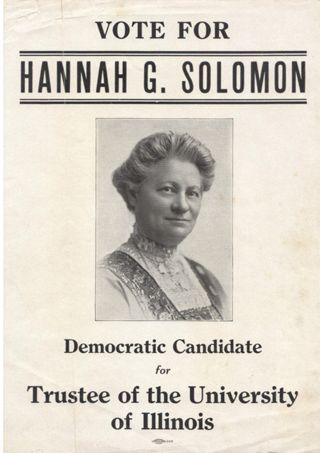From collection Candidates

In 1904 Hannah G. Solomon campaigned as a candidate of the Democratic party for the position of University of Illinois Trustee. She did not win, receiving 341,389 votes (10.64%). In 1916 the Democratic party again nominated her for this office. In endorsing her candidacy, Board member Ellen M. Henrotin said that, if elected, Solomon would "bring to the University a broad view of democratic education." She again lost, polling 925,332 votes (14.33%). This placed her fifth in line for one of three positions. Solomon may have been the first, or one of the earliest Jewish women to run for elective office in Illinois. In 1904 another Jewish woman, Pauline Steinem was elected to the Toledo, Ohio school board. annah and her older sister were the first Jewish women invited to become members of the Chicago Woman's Club (CWC) . When founding the National Council of Jewish Women (NCJW) in 1893, Solomon drew upon ideas of philanthropy and education promoted by the CWC as well as her concern that Jewish women should have civic associations through which they could help their communities. As president she worked to find common ground among religious groups. She was active in campaigning for the rights of children, and concerned with issues of juvenile delinquency. She worked to institute Chicago's first juvenile court. In 1907 Solomon was selected president of the Illinois Industrial School for Girls. She was instrumental in bringing about improvements to the school's facilities. Solomon was a friend of Jane Addams. In the 1920s Solomon joined the Women's International League for Peace and Freedom (WILPF). Her daughter held membership in WILPF in the 1930s. Solomon's father, Michael Greenebaum, was one of the first Jewish men to emigrate from Germany to Chicago. He became a successful business man. He and his wife, Sarah Spiegal Greenebaum, founded civic organizations, and were a model for Hannah, one of ten children. Hannah married Henry Solomon at the age of twenty-one and with him had three children. Henry supported his wife's civic and political ambitions.






